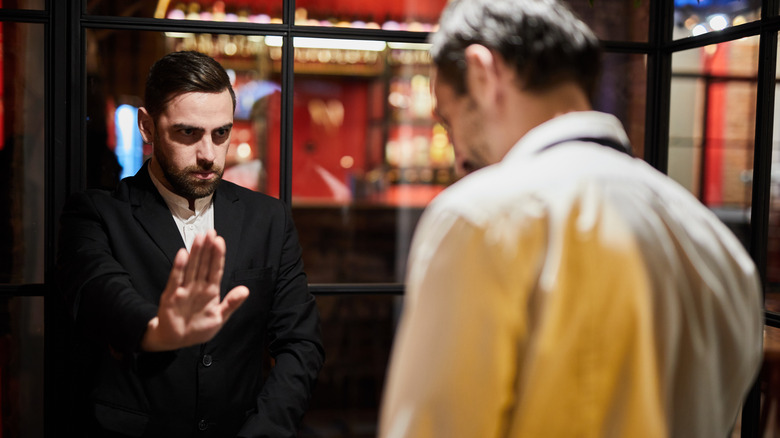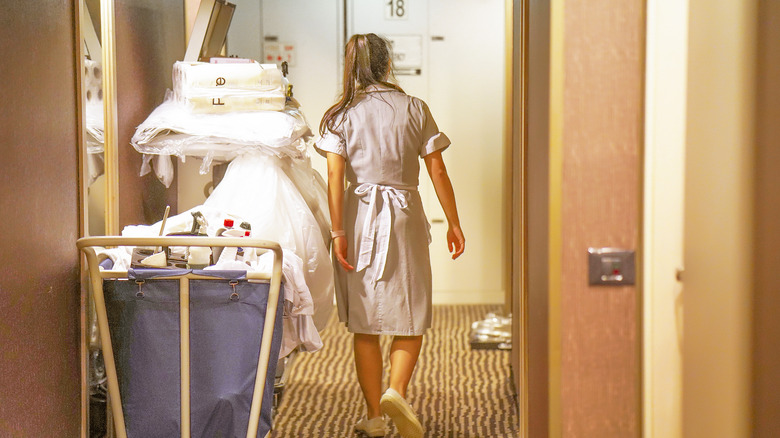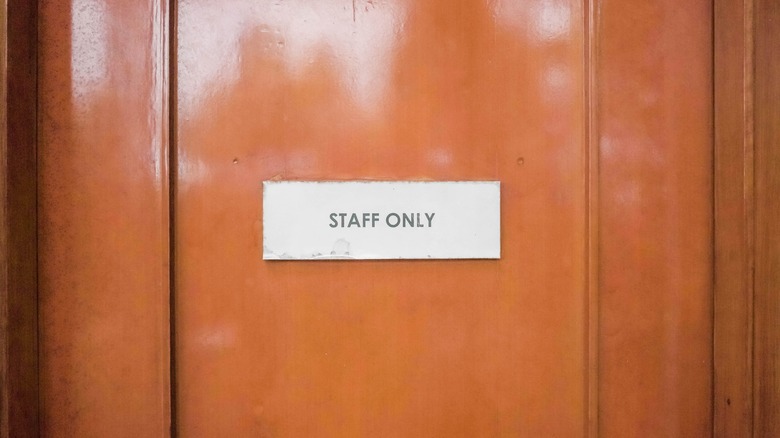10 Reasons Why A Hotel Might Kick You Out
If you've ever worked in the hospitality industry, you know hotels can get pretty wild. It's in the name, really — staff will go above and beyond to maintain an air of hospitality. This includes putting up with some less-than-pleasant guests and their rule-bending. Entering a hotel isn't the same as walking into some lawless, everything-goes universe where your actions don't have consequences. You won't get to treat the lobby as your living room and walk around without clothes or act like a rock star and trash your room. Doing so will have security showing you the door.
It's not just over-the-top actions that can get you on a hotel's bad side. Sometimes, even the mildest rule-breaking can get you booted from your room and in search of alternative accommodations. You don't want to wander the streets in a new city looking for a new hotel. Be aware of these offenses that can get you kicked out of your hotel, and toe the line of compliance to keep your travel plans right on track.
Do hotels need a reason to kick you out?
The short answer is a resounding yes. Hotels can refuse service just like any other business and ask you to leave without a reason. But they cannot do so for justifications relating to race, nationality, color, sex, or religion. Thanks to the Civil Rights Act of 1964, hotels and any other public business can't give you the boot for discriminatory reasons.
Why would a hotel want to get rid of guests, though? In almost all cases, a hotel will not kick you out willy-nilly. You'd practically have to be deemed a menace to the micro-society found within the overnight accommodations. You do have certain rights when this happens, though, which includes being able to gather your possessions. If you're asked to leave, they'll want you to do so quickly, but denying you access to your belongings would be theft on their part, and no hotel goes out looking for a lawsuit.
Every hotel does things a little bit differently. If you are expressly worried about losing your room, you should read that tiny print of the terms of service you agree to when booking. Though no one really reads it, the mouthful of legal jargon spells out the hotel's right to expel you from their premises.
1. Smoking
It may sound like an amenity that belongs in the '80s, but quite a few hotels still have smoking rooms. If you're not in one of them, though, please do not smoke. A hotel is a shared space, and cigarette smoke will coat everything in your room and possibly move to other rooms through air vents and connecting pathways. Besides being an unpleasant smell for those who don't partake in the habit, secondhand smoke is very real and can be incredibly hazardous to a person's health. This is why it's typically strictly prohibited in non-smoking rooms, and you'll likely get the boot if staff smells your smoke or another guest puts in a complaint.
It's possible to get away with smoking and not getting kicked out. If so, you should still expect a hefty cleaning fee to get the nicotine smell and residue off every possible surface of the room you stayed in. Some hotels will charge you up to $250 if they catch you smoking in their rooms, and rightly so! It takes special care and some major elbow grease to get the sticky, yellow coating off everything in the room. If you can't go a few hours without a cigarette or lay in bed without lighting up, opt for a hotel that offers smoking rooms. Be a good hotel neighbor, leave the air quality shared between rooms clean, or face hefty consequences.
2. Overstaying your welcome
As much as hotels love to have repeat customers and their rooms filled to capacity, there is typically a limit to which you can stay. Most hotels — except those that are extended stay — don't actually want you to live for long in their rooms, no matter how welcoming their taglines are. Once a person has slept in a hotel for 30 consecutive days, they are considered tenants. This can vary from state to state and can cause some serious issues for the hotel, especially if a guest has some knowledge of tenant rights and laws.
Once a guest has transformed into a tenant, they have undisputable rights, and it's hard to get them out of a room legally — whether they're still paying or not. For this reason, most hotels have a strict policy on how long a guest can stay. If you try to keep over that limit and start getting close to the 30-day mark, you'll likely have to find other accommodations for a little while.
3. Not paying
The hospitality industry is in the business of making money. As much as they would like your 5-star review and continued business, they're primarily concerned with retaining customers who pay for their stay. Simply put: If you can't pay up, you'll be put out. Most hotels now require a card in order to book a room to ensure they get paid for any property damage. However, some smaller chains and locally owned establishments accept checks or cash and don't ask for payment until you attempt to vacate the room or try to extend your stay.
If you try to stay for free and do not pay your bill when it is due, you'll be asked to leave. While these cases are getting rarer, with hotels placing safeguards to protect themselves, non-payers could be looking at heavier consequences than just being told to vacate. If you don't pay your hotel bill, you could very well get sued. The hotel could legally come after you for the money owed, especially if you charged any meals or experiences to your room. This is a great way to sully any positive memories of your vacation, so please don't stay and split.
4. Breaking the law
Though ripe for debate, many hotels don't mind disregarding non-violent and petty illegal activities in their rooms. As long as the bill is paid on time and nothing gets broken, the hotel has what it wants from the exchange. However, any illegal activity puts the hotel in danger of complicity, and it's not an overall good look for a business. Illicit drugs and criminal activity could very well get you in trouble with the hotel as well as with the law.
Drug activity and sex work are two criminal activities that often look to hotels for hosting. Those partaking certainly risk getting kicked out. More severe and harmful crimes that negatively affect other guests, like theft and violent behavior, are surefire ways to end up in major trouble. If a hotel decides to act on a guest's criminal behavior, a boot from the premises is probably the best-case scenario.
In most cases, though, the police will be called, and they will likely be the ones who come to your door to throw you out. If this happens, it won't be a different hotel you will go to — it'll be the jailhouse. If you explicitly get caught in illegal acts, it's best to leave before you're asked to.
5. Sneaking extra guests in — human or otherwise
There is a reason why you're asked how many people you're bringing when you make a reservation. It's not all about money here. Hotel and room capacities are critical safety elements, and an emergency may put you at risk if you have more roommates than permitted. It's easy for hotels to kick you out if they find out you lied on your reservation because that means you have voided your agreement.
If you plan on bringing your pet on a vacation or trip, make sure to book a pet-friendly hotel. Not only should you pay to bring little Fido, but you should also allow the staff to prepare for a non-human guest. The reality of owning an animal is that it isn't welcome everywhere, and some people can even be allergic to it. While bringing your beloved pets on vacation with you is possible, booking them correctly will ensure they and other guests are properly taken care of.
You may want to hide that you're bringing kids, additional adults, or even pets to save money, but it's not a good idea. It may cost you in the long run, whether you are fined or have to pay for a new hotel room elsewhere.
6. Vandalizing your room
It should go without saying that people don't like it when you break their stuff. As tempting as it is to live out your rockstar lifestyle dreams and trash a hotel room, it's not a great idea. For one thing, a trashed room isn't comfortable to stay in. For another, it's just plain rude to the hotel staff. Someone has to clean up your mess, and you already know it won't be you when you've been ejected from the hotel for vandalism.
You don't need to pull a Keith Moon to get kicked out, as breaking anything is grounds for immediate expulsion. Of course, accidents happen, and hotels are typically pretty understanding, even if they bill you for the damage. Throwing things against the wall, in anger or otherwise, is not only dangerous, but it's destruction of property. You could get billed, kicked out, or even have the cops called on you. If all else fails, fall back to the Golden Rule and treat a hotel as you would your own home — intact.
7. If you are rude or violent
You expect a certain level of safety when staying at a hotel, and it's the responsibility of the establishment to offer that to you and all guests. If you pose a threat to the health and sanity of another guest or employee, that is unacceptable, and you should expect to be thrown out cartoon style. No one deserves to be hurt or put in danger, and if you are the one making an otherwise safe space dangerous, you can not be allowed to stay.
While real violence isn't an everyday situation in a hotel setting, rudeness certainly is. Staying kind in frustrating situations can be hard, but showing service workers grace shouldn't be challenging. Those in the hospitality business are there to help you have a good experience, but they are not doormats and deserve to be treated with the same respect they show you. You may not get kicked out for being mean, but you could and probably should.
If you can't keep your hands to yourself and stay kind long enough to at least get through check-in, maybe you're not ready to stay at a hotel. Of course, altercations with other guests or staff members may occur later in your stay. Keep a clear head while interacting with other people, and you should be fine — most people can get through a hotel stay without assaulting anyone, verbally or otherwise.
8. Breaching policy
Some rules are made to be broken, but not in a hotel. When you're sharing space meant to be safe with dozens or hundreds of other people, rules are there for the good of all. If you can't follow the rules set out for guests, hotels have the right and the motive to cut your stay short. Don't worry; you typically won't need to read the fine print to be a good guest. Hotel rules and policies are typically common sense. If you behave like you would in any other public place and read any signs found throughout the property, you should be well within the expectations of the establishment.
Don't sneak into areas marked private. They're not meant for you, and you could be encroaching on the little space staff get to themselves out of the public eye. Similarly, if an area of the hotel has closed for the night or season, respect that boundary. Sneaking into a pool at 4 a.m. is not only rude, but it also could be a serious safety hazard. You could be kicked out of the hotel and possibly face charges. Don't put yourself, the staff, or the hotel at risk just because you couldn't be bothered to read or adhere to a sign.
9. Being loud or partying too hard
The mixed array of guests who stay in hotels is fascinating. The very same establishment that can house a family with small children can host bridal parties, conventions, and a traveling business person looking to get a good night's sleep. If a large party is booked, some hotels will attempt to corral them all on the same floor to avoid disturbing other guests. Even so, partying too hard will likely upset some guests who also paid money to be there.
Even if you know how to block out hallway noise and loud guests, that doesn't mean everyone around you wants to spend their stay wearing earplugs. Hotels are a kind of sacred space for travelers, a home-adjacent reprieve from the overstimulating newness of traveling. There is a certain expectation of relaxation when it comes to hotels, and you don't want to be the cause of someone else's bad time.
Don't worry; you're not expected to tiptoe around; a certain level of noise is expected from guests. Dogs barking, babies crying, or even elevated talking can be a normal thing to hear in some hotels. If the noise becomes constant and consistent, that usually poses a problem for other guests. Yelling, loud music, or banging on walls and moving around furniture are all things that could get your door knocked on for a noise complaint. If the noise persists, hotel staff may relieve you of your room.
10. Not dressing appropriately
Most hotels do not enforce a strict dress code, which can be a common misconception for people not accustomed to luxury stays at high-end hotels. If you're paying 5-star prices, you bet you can wear jeans or a pair of sandals if you so desire. There is some attire, though, that can get you kicked out pretty quickly. For one, wearing nothing will get you thrown out with vigor or even arrested. Skinny dipping should be saved for late nights by the ocean or lake, not a public place where unsuspecting guests could get an eye-full. This goes for any common area. Don't be that person locked out of their room in their tighty-whities; we're begging you.
A hotel may also not be thrilled if you wear offensive clothing, like a shirt with curse words or explicit material. They have a responsibility to all their guests, and you have to remember that hotels also cater to minors. Certain fashion choices like shirts depicting racism or clothing showcasing nudity could get you tossed out or at least asked to change.
What happens when you get kicked out of a hotel?
Getting expelled from a hotel depends on why you're getting kicked out and how serious your transgressions are. You will likely receive a warning before hotel staff ask that you leave the property. Hotels don't actively want to open up a previously booked room. Not only does it throw off their scheduling, but a vacant room could result in a money loss for them — that is, if you even qualify for a refund for the remainder of your stay.
If you fail to heed this warning or do something so egregious you didn't even receive one, you will likely be escorted out. First, you'll be brought to your room to remove your belongings and then escorted to the front door. Staff will reasonably not want to leave you alone, just in case you want to doll out a little payback in the form of vandalism.
The ego blows don't stop once you're off the premises, though. Some hotels keep a denylist of all their former guests whose stays got cut short. This list flags any bookings made with the same card or personal information, sometimes not allowing the reservation to be made. If you have any desire to book with a particular hotel or its brand in the future, try not to get yourself kicked out.












